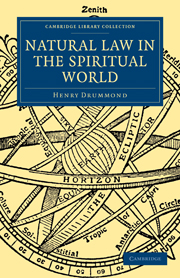Summary
“I judge of the order of the world, although I know not its end, because to judge of this order I only need mutually to compare the parts, to study their functions, their relations, and to remark their concert. I know not why the universe exists, but I do not desist from seeing how it is modified; I do not cease to see the initimate agreement by which the beings that compose it render a mutual help. I am like a man who should see for the first time an open watch, who should not cease to admire the workmanship of it, although he knows not the use of the machine, and had never seen dials. I do not know, he would say, what all this is for, but I see that each piece is made for the others: I admire the worker in the detail of his work, and I am very sure that all these wheelworks only go thus in concert for a common end which I cannot perceive.”
Rousseau.“That which is born of the flesh is flesh; and that which is born of the Spirit is spirit.”
—Christ.“In early attempts to arrange organic beings in some systematic manner, we see at first a guidance by conspicuous and simple characters, and a tendency towards arrangement in linear order. In successively later attempts, we see more regard paid to combinations of character which are essential but often inconspicuous; and a gradual abandonment of a linear arrangement.”
—Herbert Spencer.- Type
- Chapter
- Information
- Natural Law in the Spiritual World , pp. 367 - 418Publisher: Cambridge University PressPrint publication year: 2009First published in: 1883



